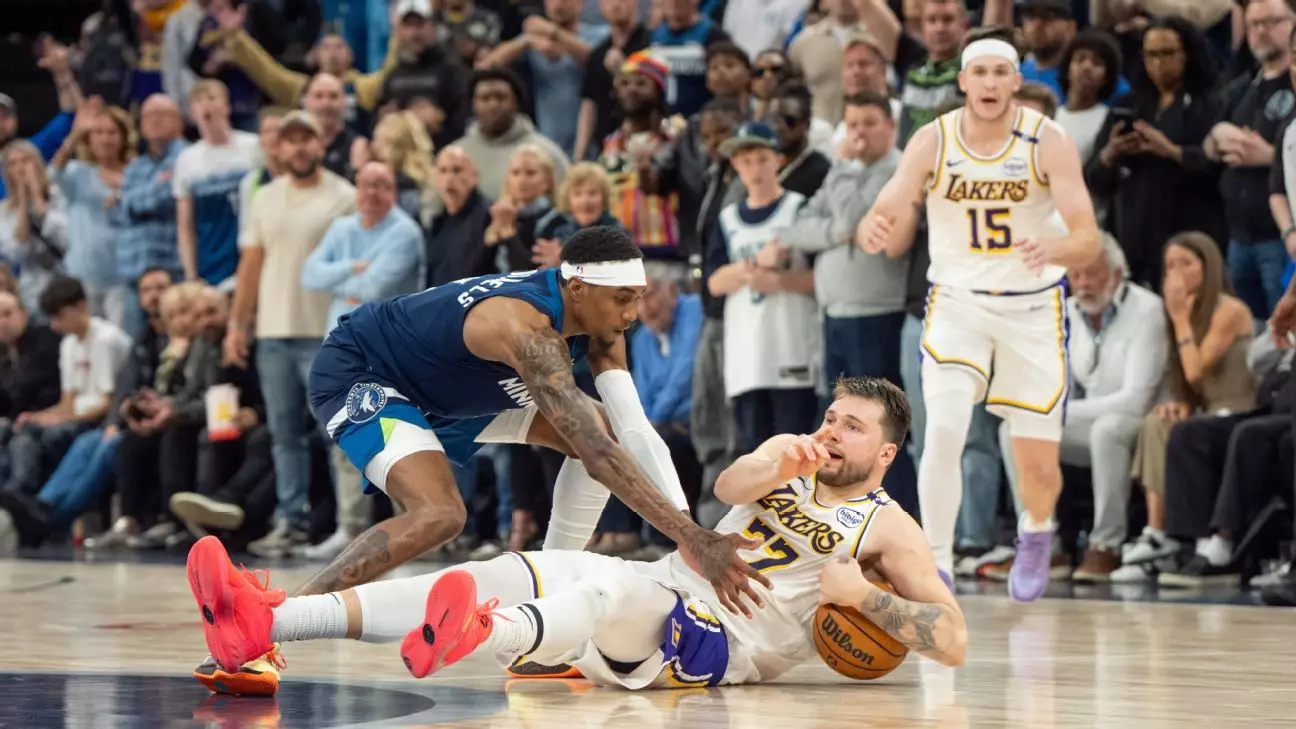In the high-stakes atmosphere of the NBA playoffs, every decision made on the court is amplified, and a single missed call can alter the course of a game. Recent events surrounding the Los Angeles Lakers’ clash with the Minnesota Timberwolves illustrate this quite vividly. With merely 33 seconds left on the clock and the Lakers trailing 114-113, an apparent foul on superstar Luka Doncic went unwhistled by the referees. This situation exemplifies how critical officiating is at pivotal moments, raising questions about the integrity of the game when crucial errors can decide outcomes.
The incident occurred when Jaden McDaniels of Minnesota stepped into Doncic’s path, causing him to stumble. The NBA later acknowledged this oversight in their “Last Two Minute Report,” noting that McDaniels’ action constituted an illegal foul that contributed significantly to the game’s momentum shifting towards Minnesota. Doncic’s credibility on the incident was clear when he openly stated, “I got tripped, for sure.” If a foul had been called, it could have led to a game-changing opportunity at the free-throw line for Doncic, potentially reversing the outcome in a contest decided by a mere three points.
Game-Changing Moments and Reflections
Furthermore, this was not a singular occurrence from that day. The playoff atmosphere was marred by another contentious no-call during the New York Knicks vs. Detroit Pistons game, wherein Tim Hardaway Jr. fell victim to a foul on a last-second three-pointer that went unpunished. The fallout from this missed call further adds to the sense of unfairness that can overwhelm fans and players alike. While both games showcased the triumphs and skills of the winning teams—Minnesota and New York—they also raise pressing questions about the effectiveness of officiating in critical situations.
LeBron James did not hold back in expressing his frustrations regarding a pivotal foul called against him on a play intended for a turnover. This indicates a pattern where superstar players feel they are on the receiving end of questionable calls, often impacting not just the game but their confidence and composure. James remarked, “Hand is part of the ball,” underscoring a sentiment that resonates with both players and fans grappling with how a ref’s subjective interpretation can dictate game flow.
The Broader Implications of Officiating in the Playoffs
The stakes are inherently higher in the postseason, with teams battling not just for wins but for legacies. Inconsistent officiating has the potential to ignite controversies that overshadow the play on the court. Such moments lead to heated debates and fan dissatisfaction, as they ultimately cast doubt on the fairness of outcomes determined by human judgments.
As we reflect on these incidents, one cannot help but wonder about potential reforms to enhance accountability and uniformity in officiating. Perhaps more transparency surrounding referee decisions could mitigate frustrations. The pressure is not only on players but also on officials, to ensure that the integrity of the game remains intact and captures the true essence of competition. After all, fans invest their emotions and loyalty into these games, and their expectation for fairness should not be compromised by human error in the heat of the moment.
As the playoffs continue, it is crucial for the NBA to take a hard look at the ramifications of these missed calls—not just for the teams involved, but for the game as a whole.


Leave a Reply